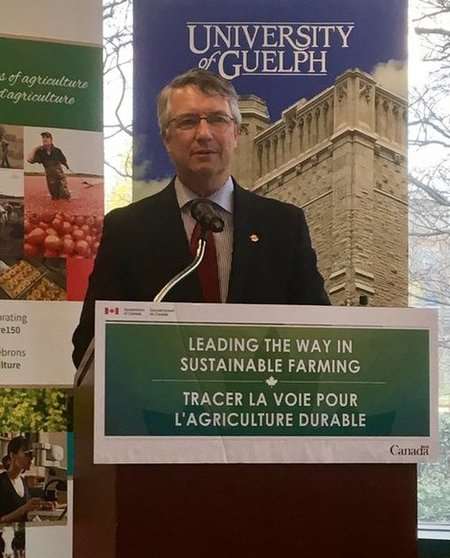The federal government is funding 3 sustainable agriculture projects
By Jennifer Jackson
It’s an exciting time for agriculture – the industry’s recognition in the 2017 Federal Budget and the Advisory Council’s Economic Growth report suggests the government is aware of the economic value the sector holds.

Lloyd Longfield, member of parliament for Guelph, at the University of Guelph Apr. 27
Lloyd Longfield, member of parliament for Guelph, announced Apr. 27 the Government is investing $2.2 million into three innovative research projects at the University of Guelph (UoG), with funds from the $27 million Agricultural Greenhouse Gases Program (AGGP). The AGGP prioritizes research in four main areas: cropping systems, livestock systems, efficiency in agricultural water usage and agroforestry.
The government will allocate the $2.2 million amongst research on:
- The effect of nitrification on nitrous oxide emissions from hog manure,
- The use of aerial sensors for determining soil organic carbon levels,
- Greenhouse gas mitigation with various agroforestry land use practices.
The Government will invest $1.6 into the University’s agroforestry research, led by Naresh Thevathasan, research manager and adjunct professor at UoG.
It is significant to know that Canada has recognized the potential that agroforestry has in mitigating greenhouse gases, he said in an announcement. One of the areas Thevathasan will examine is the impact that age has on the trees’ ability to sequester carbon.
“This is a significant investment in U of G research, innovation, and knowledge mobilization,” said Malcolm Campbell, vice president (research) at UoG, in an Apr. 27 release. “All three of these projects will help improve life and protect our planet, from improving agroforestry practices, to developing crop fertilization methods that reduce emissions, to use of aerial devices to assess soil carbon levels and elevate precision agriculture.”
The three areas of research will also give producers and the industry better knowledge on managing operations with practices that are sustainable and environmentally friendly, says Longfield.
“Science will be (agriculture’s) biggest ally,” he said in the announcement. To feed the growing population in the future, producers will need to “double their food production on the same amount of land, while also mitigating climate change – who else but farmers could do that?”